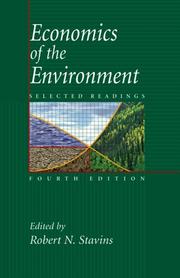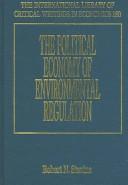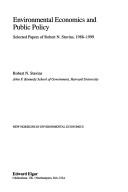| Listing 1 - 10 of 50 | << page >> |
Sort by
|

ISBN: 0393975231 9780393975239 Year: 2000 Publisher: New York: Norton,
Abstract | Keywords | Export | Availability | Bookmark
 Loading...
Loading...Choose an application
- Reference Manager
- EndNote
- RefWorks (Direct export to RefWorks)
Pollution --- Environmental policy --- Economic aspects --- Costs --- Protection de l'environnement --- environmental protection --- Biodiversité --- Biodiversity --- Surveillance de l'environnement --- Enquête --- surveys --- Coût --- costs --- Analyse économique --- Economic analysis --- Pollution - Economic aspects --- Environmental policy - Costs
Book
Year: 2010 Publisher: Cambridge, Mass. National Bureau of Economic Research
Abstract | Keywords | Export | Availability | Bookmark
 Loading...
Loading...Choose an application
- Reference Manager
- EndNote
- RefWorks (Direct export to RefWorks)
Book
Year: 2007 Publisher: Cambridge, Mass. National Bureau of Economic Research
Abstract | Keywords | Export | Availability | Bookmark
 Loading...
Loading...Choose an application
- Reference Manager
- EndNote
- RefWorks (Direct export to RefWorks)

ISBN: 1843764474 Year: 2004 Publisher: Cheltenham Elgar
Abstract | Keywords | Export | Availability | Bookmark
 Loading...
Loading...Choose an application
- Reference Manager
- EndNote
- RefWorks (Direct export to RefWorks)
Digital
Year: 2010 Publisher: Cambridge, Mass. National Bureau of Economic Research
Abstract | Keywords | Export | Availability | Bookmark
 Loading...
Loading...Choose an application
- Reference Manager
- EndNote
- RefWorks (Direct export to RefWorks)
The problem of the commons is more important to our lives and thus more central to economics than a century ago when Katharine Coman led off the first issue of the American Economic Review. As the U.S. and other economies have grown, the carrying-capacity of the planet — in regard to natural resources and environmental quality — has become a greater concern, particularly for common-property and open-access resources. The focus of this article is on some important, unsettled problems of the commons. Within the realm of natural resources, there are special challenges associated with renewable resources, which are frequently characterized by open-access. An important example is the degradation of open-access fisheries. Critical commons problems are also associated with environmental quality. A key contribution of economics has been the development of market-based approaches to environmental protection. These instruments are key to addressing the ultimate commons problem of the twenty-first century — global climate change
Digital
Year: 2007 Publisher: Cambridge, Mass. NBER
Abstract | Keywords | Export | Availability | Bookmark
 Loading...
Loading...Choose an application
- Reference Manager
- EndNote
- RefWorks (Direct export to RefWorks)
Book
Year: 2007 Publisher: Cambridge National Bureau Of Economic Research.
Abstract | Keywords | Export | Availability | Bookmark
 Loading...
Loading...Choose an application
- Reference Manager
- EndNote
- RefWorks (Direct export to RefWorks)

ISBN: 1840643331 Year: 2000 Publisher: Aldershot Elgar
Abstract | Keywords | Export | Availability | Bookmark
 Loading...
Loading...Choose an application
- Reference Manager
- EndNote
- RefWorks (Direct export to RefWorks)
Environmental economics --- Environmental law --- Environmental policy --- Compliance costs --- Economic aspects --- United States --- Economic policy --- Environmental aspects.
Digital
Year: 2012 Publisher: Cambridge, Mass. National Bureau of Economic Research
Abstract | Keywords | Export | Availability | Bookmark
 Loading...
Loading...Choose an application
- Reference Manager
- EndNote
- RefWorks (Direct export to RefWorks)
The outcome of the December 2011 United Nations climate negotiations in Durban, South Africa, provides an important new opportunity to move toward an international climate policy architecture that is capable of delivering broad international participation and significant global CO2 emissions reductions at reasonable cost. We evaluate one important component of potential climate policy architecture for the post-Durban era: links among independent tradable permit systems for greenhouse gases. Because linkage reduces the cost of achieving given targets, there is tremendous pressure to link existing and planned cap-and-trade systems, and in fact, a number of links already or will soon exist. We draw on recent political and economic experience with linkage to evaluate potential roles that linkage may play in post-Durban international climate policy, both in a near-term, de facto architecture of indirect links between regional, national, and sub-national cap-and-trade systems, and in longer-term, more comprehensive bottom-up architecture of direct links. Although linkage will certainly help to reduce long-term abatement costs, it may also serve as an effective mechanism for building institutional and political structure to support a future climate agreement.
Digital
Year: 2018 Publisher: Cambridge, Mass. National Bureau of Economic Research
Abstract | Keywords | Export | Availability | Bookmark
 Loading...
Loading...Choose an application
- Reference Manager
- EndNote
- RefWorks (Direct export to RefWorks)
The U.S. Clean Air Act, passed in 1970 with strong bipartisan support, was the first environmental law to give the Federal government a serious regulatory role, established the architecture of the U.S. air pollution control system, and became a model for subsequent environmental laws in the United States and globally. We outline the Act's key provisions, as well as the main changes Congress has made to it over time. We assess the evolution of air pollution control policy under the Clean Air Act, with particular attention to the types of policy instruments used. We provide a generic assessment of the major types of policy instruments, and we trace and assess the historical evolution of EPA's policy instrument use, with particular focus on the increased use of market-based policy instruments, beginning in the 1970s and culminating in the 1990s. Over the past fifty years, air pollution regulation has gradually become much more complex, and over the past twenty years, policy debates have become increasingly partisan and polarized, to the point that it has become impossible to amend the Act or pass other legislation to address the new threat of climate change.
| Listing 1 - 10 of 50 | << page >> |
Sort by
|

 Search
Search Feedback
Feedback About UniCat
About UniCat  Help
Help News
News